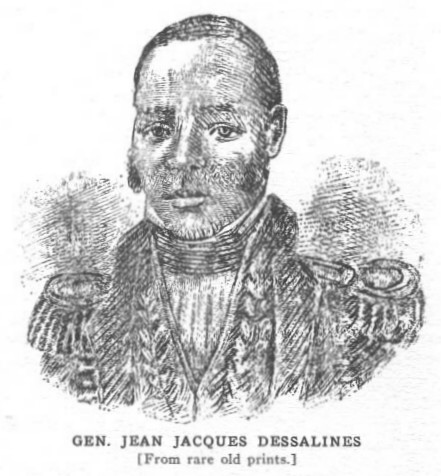
Today is a public holiday in Haiti, it’s “Anniversaire de la mort de Dessalines” anniversary of the death of Dessalines. Jean-Jacques Dessalines was a military leader who worked with Toussaint L’Ouverture and gave the country of Haiti its name.
According to Bio:
Born around 1758 in Africa, Jean-Jacques Dessalines was enslaved in the French colony of Saint-Domingue. He served as a lieutenant under Toussaint L’Ouverture after the 1791 slave revolt and later repelled incoming French forces. Dessalines renamed the colony Haiti in 1804 and declared himself emperor. A severe, oftentimes brutal leader, he was killed in a mulatto revolt on October 17, 1806, in Pont Rouge, near Port-au-Prince, Haiti.
Colonial Life
Born circa 1758 in Africa, Jean-Jacques Dessalines was enslaved in Saint-Dominque, the French West Indian colony currently known as Haiti. He toiled in the fields until 1791, when a slave rebellion broke out in the colony in the wake of the French Revolution. Dessalines fought against the colonial power and positioned himself as lieutenant to the black leader Toussaint L’Ouverture. The movement succeeded, and in 1793 slavery was abolished in the colony.
buy finpecia online https://www.indcheminternational.com/wp-content/uploads/2025/01/png/finpecia.html no prescription pharmacy
Leading a Revolution
L’Ouverture served as governor-general until the French sent Napoleon Bonaparte’s forces to the island in 1802. Bonaparte captured L’Ouverture and planned to reinstate slavery. But in 1803, Dessalines became the leader of a new revolution that began in opposition to the French regime.
With British aid, the rebels defeated the French, and on January 1, 1804, Dessalines declared the island an independent country called Haiti. Haiti became the first black independent republic in the world. The newly signed declaration of independence named Dessalines as governor-general for life, and in 1805, he declared himself emperor and took the name Jacques I.
Emperor of Haiti
Dessalines soon proved to be a ruthless ruler. He enforced a system of plantation labor for blacks.
buy soft cialis online https://www.indcheminternational.com/wp-content/uploads/2025/01/png/soft-cialis.html no prescription pharmacyUnder the law, all blacks had to either work in the fields or join the military. However, perhaps as retribution for the years he was enslaved, Dessalines was most harsh to whites. He did not allow them to own property, and to prevent a return to French power, he killed thousands of whites in a mass genocide campaign.
Dessalines also practiced discrimination against mulattoes and was eventually killed during a mulatto revolt on October 17, 1806, in Pont Rouge, Haiti, the result of an assassination plot orchestrated by the mixed-race leader of the revolt, Alexandre Pétion.
Legacy
Despite his violent reign, Dessalines lives on as a figure of pride for Haitians. The day of his death, October 17, is a national holiday in Haiti. Dessalines’s legacy is embodied in Haiti’s national anthem, “La Dessalinienne.”






























